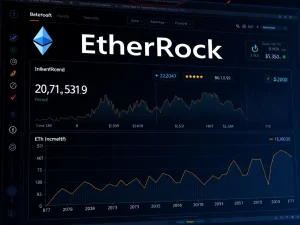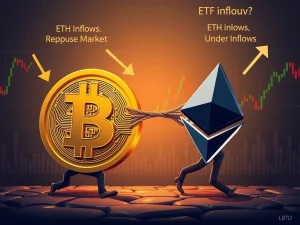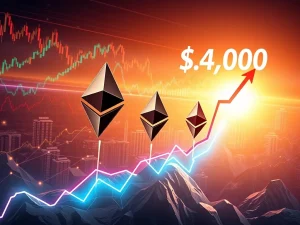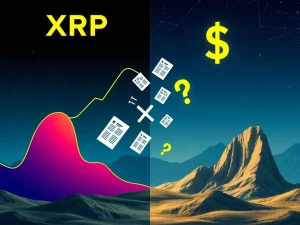Ether Investment: SharpLink’s Strategic $667M Purchase Signals Unprecedented Institutional Confidence

A monumental shift is occurring within the digital asset landscape. Financial markets recently witnessed a significant move from a prominent player. SharpLink Gaming, a sports betting platform, made a substantial Ether investment. This bold acquisition totaled $667 million. It underscores a growing trend: institutional entities are increasingly embracing cryptocurrencies. This particular Ether investment signals strong confidence in the Ethereum network’s future. It also highlights the accelerating pace of institutional Ethereum adoption across various sectors.
SharpLink Gaming’s Bold Ether Investment
SharpLink Gaming recently made headlines with a massive Ether investment. The company acquired 143,593 Ether (ETH) last week. This purchase occurred as the cryptocurrency approached its all-time high values. According to a filing with the US Securities and Exchange Commission (SEC) on Tuesday, SharpLink paid an average price of $4,648 per ETH. This brought the total acquisition cost to approximately $667.4 million. Consequently, this strategic move boosted SharpLink’s total Ether holdings significantly. Their portfolio now boasts 740,760 ETH. At current market prices, these holdings are valued at about $3.2 billion. This demonstrates a clear long-term strategy by the company.
This substantial Ether investment places SharpLink among the top corporate holders of digital assets. Furthermore, it reflects a broader market sentiment. Many large institutions are now viewing Ether as a crucial component of their treasury management. This strategic acquisition at near-record prices indicates strong conviction. SharpLink believes in Ethereum’s underlying technology and its potential for future growth. The company is actively diversifying its assets. It is moving beyond traditional financial instruments into the volatile yet promising crypto space. This commitment is notable.
Accelerating Institutional Ethereum Adoption
SharpLink’s recent actions are not isolated incidents. They represent a significant acceleration in institutional Ethereum adoption. Across the board, major players are integrating ETH into their portfolios. Spot Ether exchange-traded funds (ETFs) have seen tremendous activity. These ETFs recorded a staggering $3.7 billion in inflows. This occurred during the period from August 5 to Thursday. Such figures underscore the escalating demand from institutional investors. They seek exposure to the Ethereum ecosystem. Therefore, this trend suggests a maturation of the crypto market.
Many factors contribute to this increased interest. Firstly, Ethereum’s robust ecosystem supports decentralized finance (DeFi), NFTs, and various Web3 applications. Secondly, its upcoming technological advancements, like sharding, promise enhanced scalability. Finally, the move to a Proof-of-Stake (PoS) consensus mechanism has made it more energy-efficient. These elements collectively enhance Ethereum’s appeal. Institutions are recognizing its potential as a foundational layer for the next generation of the internet. This widespread adoption could stabilize prices. It may also reduce volatility over time. This makes it more attractive for large-scale investments.
Unlocking Value with ETH Staking Rewards
Beyond simply holding Ether, SharpLink Gaming is actively participating in the Ethereum network. The company announced it generated 1,388 ETH in ETH staking rewards. This means SharpLink deployed a significant portion of its Ether holdings. They participate as a validator in Ethereum’s Proof-of-Stake (PoS) network. Staking involves locking up ETH to support network operations. In return, participants earn rewards. This process contributes to the network’s security and efficiency. It also provides an additional revenue stream for holders.
SharpLink’s SEC filing on August 17, 2025, confirmed this strategy. “Substantially all of the ETH Holdings were deployed in staking, including through liquid staking,” the company stated. Liquid staking allows users to stake their ETH while retaining liquidity. They receive a tokenized representation of their staked ETH. This flexibility makes staking more appealing for large corporate treasuries. However, SharpLink also acknowledged potential regulatory changes. “We note that aspects of our staking activities may be subject to government regulation and guidance subject to change,” the company added. This highlights the evolving legal landscape surrounding digital assets. It also shows a proactive approach to compliance.
Market Reaction and Financial Context
Despite the positive news regarding its Ether investment, SharpLink’s shares reacted negatively. The stock tumbled 12% on Friday following the announcement. It closed trading at $20.10 on Monday. This represented a 13.5% decline over the past five trading days, according to TradingView. This immediate market reaction can be attributed to several factors. Investors sometimes react cautiously to large, unconventional investments. This is especially true in the volatile cryptocurrency market. The company also reported a $103 million net loss for the second quarter of 2025. This loss significantly contributed to a paper loss. It resulted from accounting for liquid staked Ether (LsETH).
Accounting for digital assets, particularly those involved in staking, presents unique challenges. These challenges can impact a company’s reported earnings. Consequently, this might deter some traditional investors. Despite the stock’s short-term dip, the underlying strategic move remains significant. It positions SharpLink for potential long-term gains. The company is embracing a new asset class. This decision could prove beneficial as the crypto market matures. Investors often need time to fully digest such bold corporate strategies. Therefore, the long-term implications are still unfolding.
The Rise of Corporate Crypto Holdings
SharpLink’s aggressive Ether acquisition is part of a larger trend. Many corporations are building substantial corporate crypto holdings. BitMine, a major rival in the ETH treasury space, leads this charge. BitMine reported a massive 373,000 Ether purchase on Monday. This acquisition boosted its total holdings to an impressive 1.52 million ETH. These holdings are currently valued at about $6.6 billion. According to BitMine board chair Thomas Lee, this new ETH purchase solidified BitMine’s position. It became the second-largest crypto treasury globally. Only Michael Saylor’s MicroStrategy holds a larger crypto treasury.
MicroStrategy continues to dominate the corporate Bitcoin holdings. After a modest $51.4 million Bitcoin (BTC) purchase on Monday, MicroStrategy held a total of 629,376 BTC as of Sunday. These holdings are worth approximately $72.7 billion at current market prices. This comparison highlights the growing diversity in corporate crypto strategies. While MicroStrategy focuses on Bitcoin, companies like SharpLink and BitMine are heavily investing in Ethereum. This diversification reflects varying risk appetites and strategic outlooks. It also indicates a maturing ecosystem where multiple digital assets hold significant value for corporate treasuries.
Future Outlook for Institutional Crypto Investment
The actions of companies like SharpLink, BitMine, and MicroStrategy paint a clear picture. Institutional crypto investment is not just a passing fad. It is a fundamental shift in corporate finance. As regulatory clarity improves, more traditional companies may enter the space. The continued development of user-friendly investment vehicles, such as spot Ether ETFs, further facilitates this trend. These developments lower barriers to entry for large financial entities. Consequently, the market sees increased liquidity and broader participation.
The strategic accumulation of Ether by major corporations suggests a belief in its long-term utility and value. Ethereum’s role as a platform for innovation continues to expand. This attracts significant capital. The integration of digital assets into corporate balance sheets marks a new era. It moves cryptocurrencies from speculative investments to recognized assets. This evolution could lead to greater market stability. It might also foster further innovation within the blockchain space. Therefore, the future appears promising for continued institutional engagement with cryptocurrencies.









